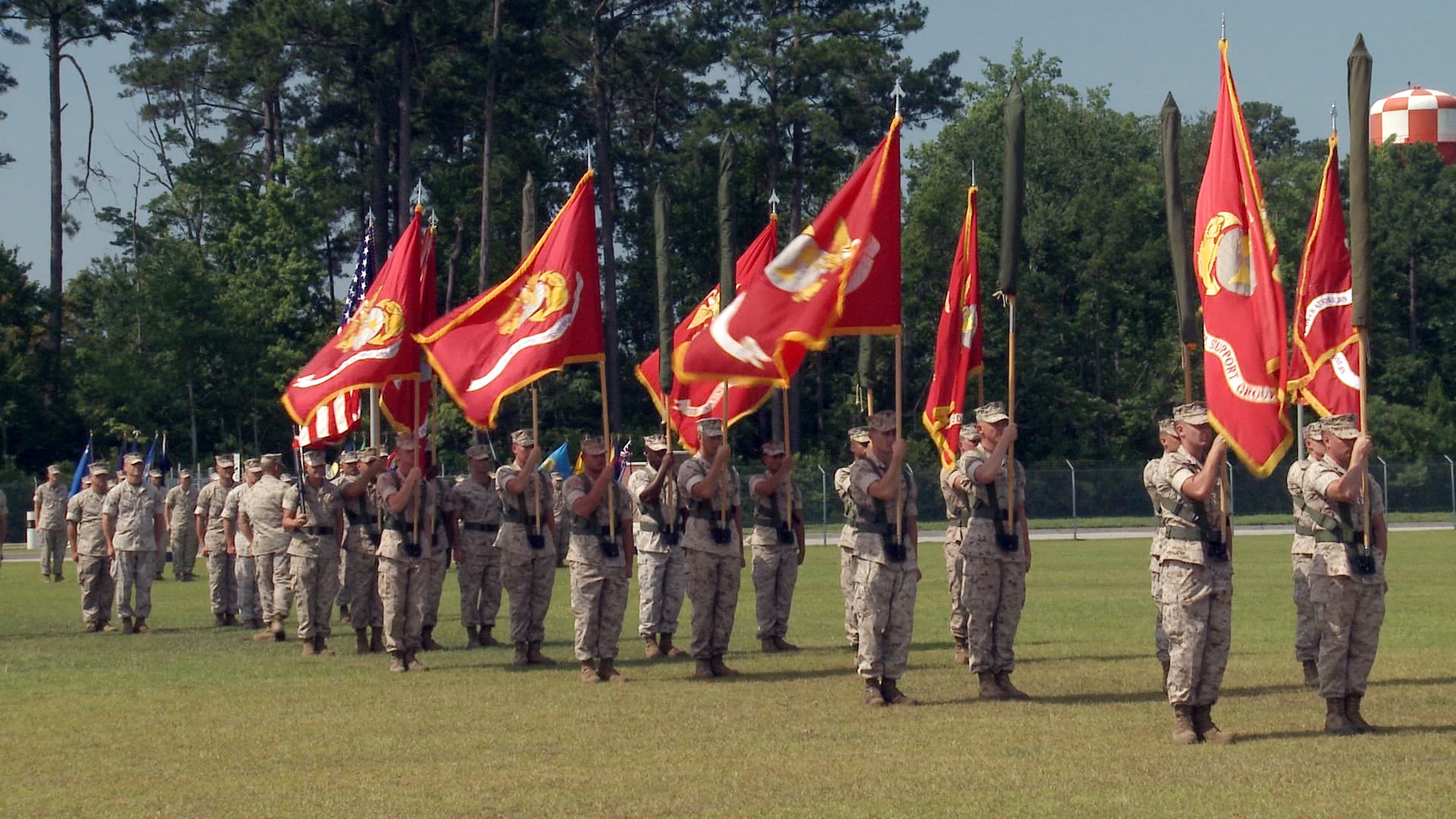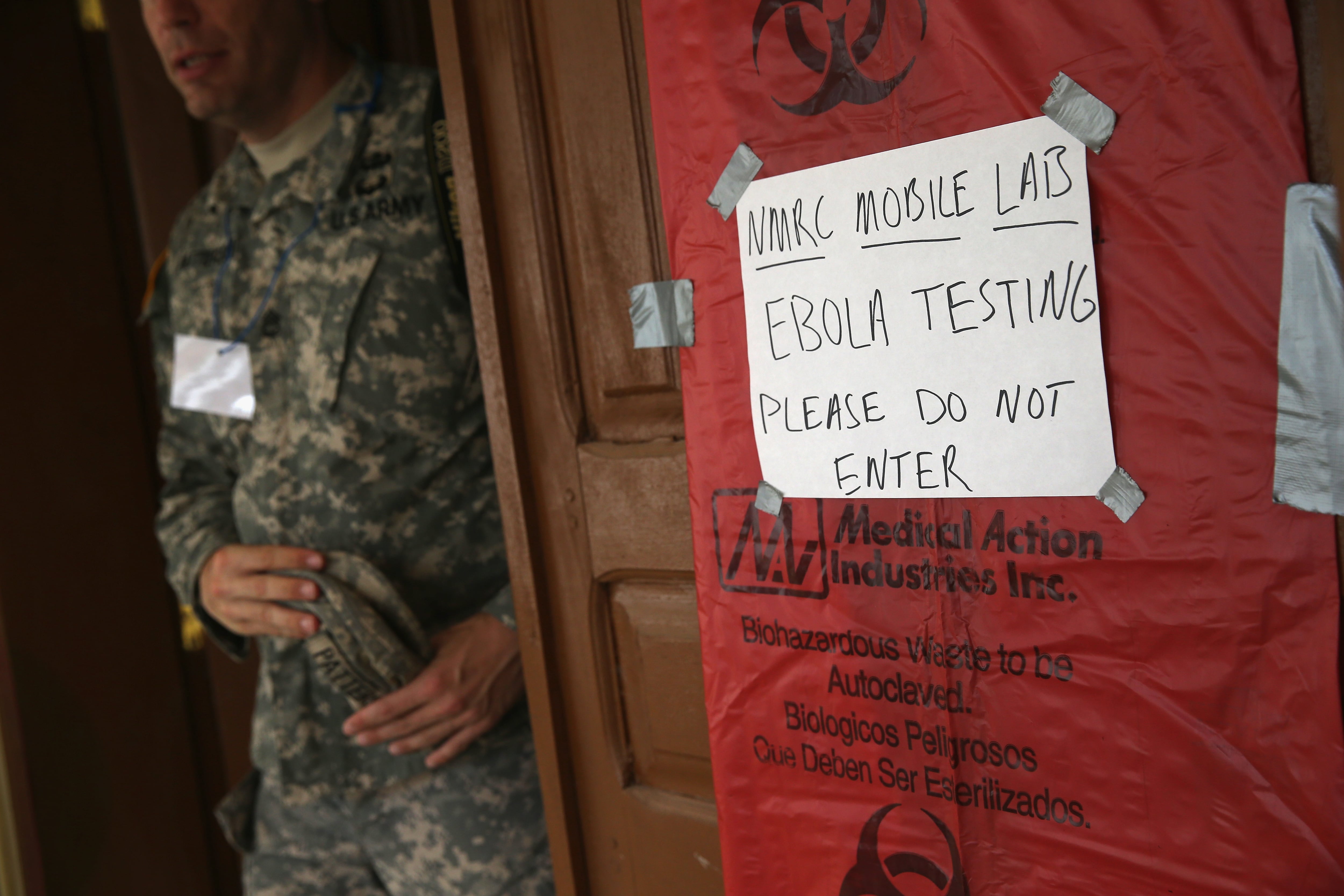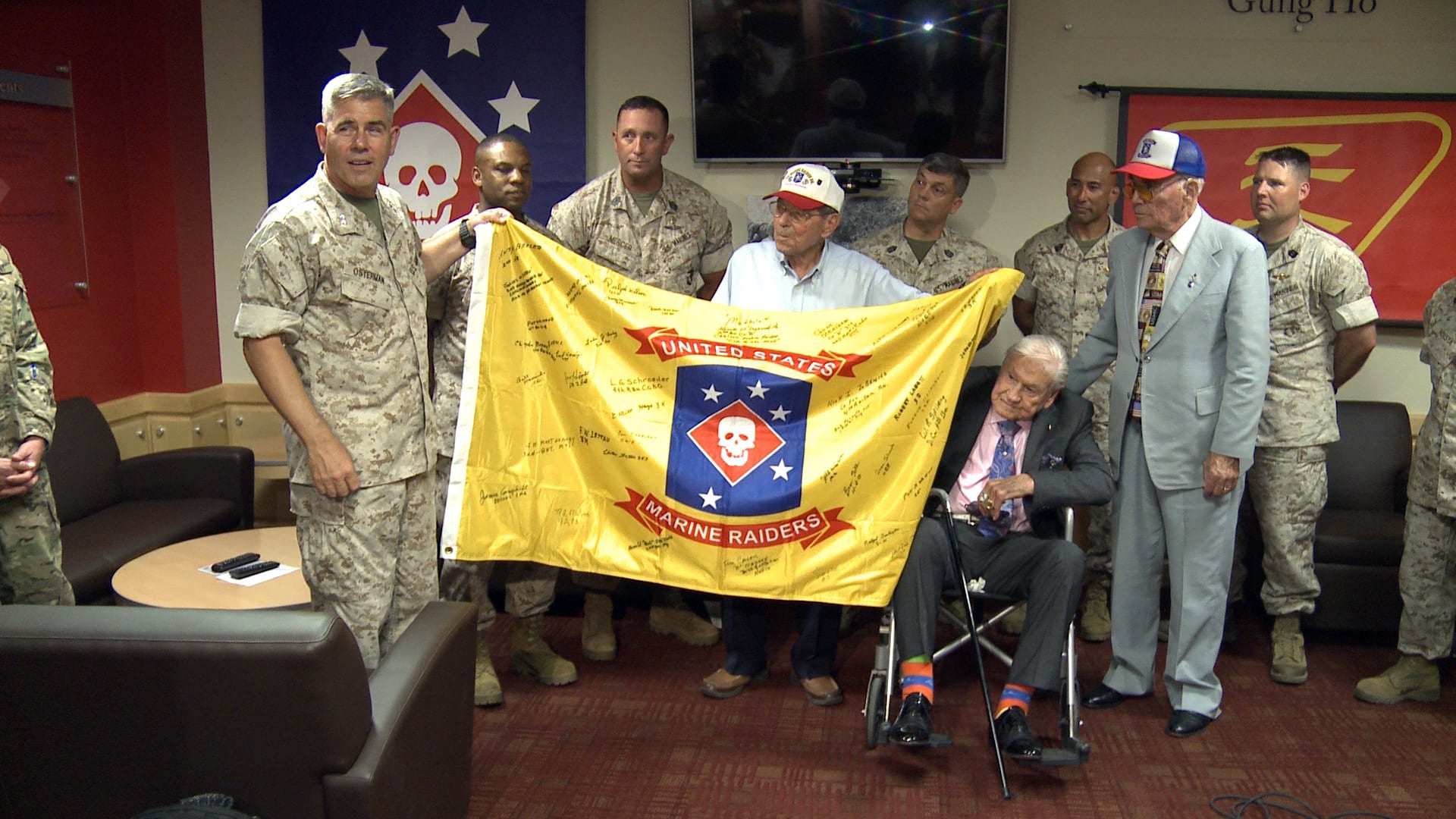CAMP LEJEUNE, N.C. — The Marine Raiders are back.
In a brief formal ceremony at its headquarters here Friday, Marine Corps Forces Special Operations Command momentarily deactivated its eight subordinate units, reactivating them immediately with new names and new battle colors bearing the Raiders' name.
For Kenneth "Mudhole" Merrill, 91, one of three original World War II Raiders at the ceremony, the new name carries with it the hope of a pedigree that won't die out.
"Today's our day. Our legacy goes on now. This is the greatest thing that ever happened," Merrill said, eyes misting. "And I know that all our dead buddies, our companions, I know that they're jumping for joy. And there's not very many of us left, I know, but this is a great, great moment for us."

MARSOC Marines roll up their colors before unfurling new ones that mention the historic "Raiders" name that was approved for the unit at a ceremony Friday , June 19, 2015.
Photo Credit: Daniel Woolfolk/Staff
The renaming comes after nearly a decade of advocacy by the original Raiders and their families. Activated from 1942 to 1944 for high-stakes island raids and amphibious missions in the Pacific, the Raiders are considered the original special operations element to fight in World War II.
When the four Raider battalions were deactivated after two years in combat, the 7,710 Marines and 368 sailors who fought under the name had covered themselves in glory. According to data from the Marine Raider Association and Foundation, the Raiders together earned seven Medals of Honor, 141 Navy Crosses and 330 Silver Stars.

The move to reclaim the Raiders' name designates the Marines' 9-year-old special operations command as the heir to this legacy. The renaming was formally approved by Gen. James Amos, former commandant of the Marine Corps, just prior to his retirement last fall. Amos had previously rejected a 2011 proposal to rename MARSOC units for the Raiders on the grounds that the move would detract from MARSOC troops' core identity as Marines.
"He made it clear that the tie, the connection to our past is absolutely important to him, but we're not going to name a unit by some naming convention — any unit in the Marine Corps — because we're Marines first," then-Brig. Gen. David Berger told Marine Corps Times at the time about the decision. The same angst accompanied the creation of the original Raiders. The 17th commandant, Maj. Gen. Thomas Holcomb, opposed the creation of a special commando unit, believing that the term "Marine" was all that a member of the Corps needed, according to an account in "The Do-or-Die Men," a 2003 history of the first Marine Raider battalion.
Maj. Gen. Joseph Osterman, MARSOC's current commander, said that while the command previously lacked the "institutional maturity" to take on the name and the identity that came with it, the time had finally come to embrace the Raider legacy.
"Most of our World War II Raiders are getting very old and at this point they want their legacy to be carried on," Osterman said. "MARSOC Raiders, just like you have the Navy SEALs and the Army Rangers, it just becomes a name that is affiliated with us, associated with the mission that we do as Marines, which is special operations."
Merrill, who was a member of the 4th Marine Raider battalion, led by Lt. Col. James Roosevelt, oldest son of President Franklin Roosevelt, had a blunter take.
"Well, I think [the MARSOC Marines] should be a special deal, absolutely," he said. "Because the training is different. These guys are trained to kill and they could do it. And so could we."

MARSOC's commander, Maj. Gen. Joseph Osterman, left, stands with veteran Marine Raiders during a ceremony at Stone Bay aboard Camp Lejeune, N.C., on June 19. MARSOC units took on the Raider name during the event.
Photo Credit: Daniel Woolfolk/Staff
Charles Meacham Sr., 89, an original Raider and an active member of the association and foundation along with his son Chuck Jr., said he never gave up hope that MARSOC would eventually take the Raiders' name.
"That's a decision of the commandant and the elite generals," he said. "We just wanted to see it happen. And we pushed to make it happen. We're delighted it did."
Along with Merrill and Harold Berg, another surviving Raider, he presented Osterman and a group of newly named active-duty Raiders with a yellow flag bearing the iconic Raider logo with its skull on a red background and blue "Southern Cross" constellation. On the flag were signatures from dozens of surviving original Raiders.
The flag, Osterman said, would hang in the Raider Room at MARSOC headquarters, a well-appointed shrine to the Raiders' legacy hung with photographs of the World War II Marines.
For one critical skills operator with Marine Special Operations School, the renaming will also develop MARSOC's identity within the special operations community.
The Marine, a gunnery sergeant who asked that his name not be used due to operational concerns, said the Raiders' moniker could give MARSOC operators the kind of name recognition that other special operators enjoy.
"I work in a joint command right now. I've been on teams with operators from different [combatant commands]," he said. "If we're in a group of people and they don't understand special operations, instantly if someone says 'SEAL,' they recognize it. It's hard for people to understand critical skills operator."
The Marine, a founding member of MARSOC, said the Corps' identity would remain paramount for the special operators, even with their newfound identity.
"What we bring to the table is a different skill set as opposed to other Marine Corps units. We bring different packaging as well," the gunnery sergeant said. "It's inherently different. It doesn't make us any better; it doesn't make us any worse. My hope is that we're known as the world's best fighting force. I don't think that's going to change. It's just going to be easier to identify."




